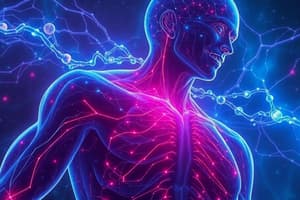Podcast
Questions and Answers
Which substance can impair neuromuscular transmission when taken in high doses?
Which substance can impair neuromuscular transmission when taken in high doses?
- Antibiotics
- Quinine
- Magnesium (correct)
- Corticosteroids
What effect does exposure to heat have on myasthenia gravis (MG) symptoms?
What effect does exposure to heat have on myasthenia gravis (MG) symptoms?
- It has no effect
- It stabilizes neuromuscular transmission
- It worsens muscle weakness (correct)
- It improves muscle strength
Which hormonal fluctuation is known to potentially exacerbate symptoms in women with MG?
Which hormonal fluctuation is known to potentially exacerbate symptoms in women with MG?
- Menstrual cycle hormones (correct)
- Stress hormones
- Thyroid hormones
- Insulin
Which of the following can lead to prolonged muscle paralysis in MG patients during surgery?
Which of the following can lead to prolonged muscle paralysis in MG patients during surgery?
Which condition, characterized by low potassium levels, can worsen muscle function in MG patients?
Which condition, characterized by low potassium levels, can worsen muscle function in MG patients?
How can thyroid dysfunction impact myasthenia gravis symptoms?
How can thyroid dysfunction impact myasthenia gravis symptoms?
What is the term for the drooping of one or both eyelids associated with ocular muscle weakness in MG?
What is the term for the drooping of one or both eyelids associated with ocular muscle weakness in MG?
Which factor can exacerbate myasthenia gravis symptoms during pregnancy?
Which factor can exacerbate myasthenia gravis symptoms during pregnancy?
What is a distinguishing feature of ocular myasthenia?
What is a distinguishing feature of ocular myasthenia?
Which of the following best describes dysarthria?
Which of the following best describes dysarthria?
What type of muscle weakness is commonly associated with a myasthenic crisis?
What type of muscle weakness is commonly associated with a myasthenic crisis?
Which symptom is indicative of generalized myasthenia?
Which symptom is indicative of generalized myasthenia?
What factors can exacerbate symptoms of myasthenia gravis?
What factors can exacerbate symptoms of myasthenia gravis?
In limb muscle weakness due to myasthenia gravis, where is the weakness typically most pronounced?
In limb muscle weakness due to myasthenia gravis, where is the weakness typically most pronounced?
What is the expected progression of symptoms in patients with ocular myasthenia?
What is the expected progression of symptoms in patients with ocular myasthenia?
How does muscle weakness in myasthenia gravis typically behave throughout the day?
How does muscle weakness in myasthenia gravis typically behave throughout the day?
Which pathway is known as the secondary drainage route for aqueous humor?
Which pathway is known as the secondary drainage route for aqueous humor?
What mechanical condition can lead to increased intraocular pressure (IOP)?
What mechanical condition can lead to increased intraocular pressure (IOP)?
Which type of glaucoma is characterized by a blockage of the drainage angle by the iris?
Which type of glaucoma is characterized by a blockage of the drainage angle by the iris?
What often occurs in the early stages of glaucoma that patients may not notice?
What often occurs in the early stages of glaucoma that patients may not notice?
In Normal-Tension Glaucoma (NTG), what primarily contributes to the optic nerve damage?
In Normal-Tension Glaucoma (NTG), what primarily contributes to the optic nerve damage?
What type of vision loss is commonly associated with advanced stages of glaucoma?
What type of vision loss is commonly associated with advanced stages of glaucoma?
Which condition is characterized by an acute increase in IOP and is considered an ophthalmic emergency?
Which condition is characterized by an acute increase in IOP and is considered an ophthalmic emergency?
What neurotransmitter release is associated with excitotoxic damage in glaucoma?
What neurotransmitter release is associated with excitotoxic damage in glaucoma?
What is the primary purpose of a Corpus Callosotomy in epilepsy treatment?
What is the primary purpose of a Corpus Callosotomy in epilepsy treatment?
Which dietary approach is particularly beneficial for children with drug-resistant epilepsy?
Which dietary approach is particularly beneficial for children with drug-resistant epilepsy?
What is one of the main functions of Vagus Nerve Stimulation (VNS)?
What is one of the main functions of Vagus Nerve Stimulation (VNS)?
Which of the following is NOT considered a common seizure trigger?
Which of the following is NOT considered a common seizure trigger?
What type of therapy can help address emotional and psychological challenges faced by individuals with epilepsy?
What type of therapy can help address emotional and psychological challenges faced by individuals with epilepsy?
Which of the following is used for emergency management in cases of Status Epilepticus?
Which of the following is used for emergency management in cases of Status Epilepticus?
Which of the following safety measures is recommended for individuals with epilepsy?
Which of the following safety measures is recommended for individuals with epilepsy?
What monitoring method is essential for tracking seizure activity in patients?
What monitoring method is essential for tracking seizure activity in patients?
Which of the following is a common symptom in the early stages of open-angle glaucoma?
Which of the following is a common symptom in the early stages of open-angle glaucoma?
What is a potential effect of hormonal changes in postmenopausal women on glaucoma risk?
What is a potential effect of hormonal changes in postmenopausal women on glaucoma risk?
What distinguishes acute angle-closure glaucoma from other types?
What distinguishes acute angle-closure glaucoma from other types?
Which factor may indirectly affect glaucoma risk through oxidative stress mechanisms?
Which factor may indirectly affect glaucoma risk through oxidative stress mechanisms?
What vision issue is commonly associated with progressed stages of open-angle glaucoma?
What vision issue is commonly associated with progressed stages of open-angle glaucoma?
Which of the following is not a symptom of acute angle-closure glaucoma?
Which of the following is not a symptom of acute angle-closure glaucoma?
Normal-tension glaucoma symptoms are similar to which type of glaucoma?
Normal-tension glaucoma symptoms are similar to which type of glaucoma?
Which symptom is characteristic of chronic angle-closure glaucoma?
Which symptom is characteristic of chronic angle-closure glaucoma?
Study Notes
Myasthenia Gravis (MG) Triggers and Clinical Manifestations
- Magnesium: High-dose magnesium can impair neuromuscular transmission; caution with magnesium-containing antacids or supplements.
- Neuromuscular Blocking Agents: Common in anesthesia; these agents can exacerbate MG symptoms and lead to prolonged weakness.
- Quinine and Quinidine: Antimalarial and antiarrhythmic drugs that may worsen MG symptoms.
- Corticosteroids: Can initially worsen MG symptoms before leading to improvement in treatment.
Environmental Impact on Symptoms
- Heat: Elevated temperatures from weather, fever, or hot baths can worsen muscle weakness and interfere with neuromuscular transmission.
- Cold: Cold exposure may also exacerbate MG symptoms in some patients.
Hormonal Influences
- Thyroid Dysfunction: Both hyperthyroidism and hypothyroidism can worsen MG symptoms; thyroid disease frequently coexists with MG.
- Pregnancy: Changes in the immune system during pregnancy can exacerbate MG symptoms.
Surgical Considerations
- Surgery: Especially procedures requiring anesthesia, can stress the body and worsen symptoms; neuromuscular blockers pose a significant risk for MG patients.
Menstrual Cycle Effects
- Menstruation: Hormonal fluctuations during the menstrual cycle may lead to symptom exacerbation in some women with MG.
Electrolyte Disturbances
- Hypokalemia: Low potassium levels can interfere with muscle function and worsen MG symptoms.
Clinical Manifestations of Myasthenia Gravis
- Ocular Muscle Weakness: Symptoms include ptosis (drooping eyelids) and diplopia (double vision); can be the first indication of MG.
- Bulbar Muscle Weakness: Affects speech and swallowing; symptoms include dysarthria, dysphagia, chewing fatigue, and facial weakness.
- Limb Muscle Weakness: Primarily affects proximal muscles, making activities like climbing stairs and lifting challenging; weakness is often asymmetric and fluctuates.
- Respiratory Muscle Weakness: Results in dyspnea; can lead to a myasthenic crisis requiring immediate medical intervention.
- Generalized Muscle Weakness: Weakness may progress from ocular symptoms to a more generalized form, often fluctuating throughout the day and worsening with activity.
Exacerbation and Fluctuation of Symptoms
- Symptoms of MG tend to fluctuate with activity; stress, infections, heat, and fatigue can exacerbate these symptoms.
Laboratory and Diagnostic Tests
- Serologic Testing: Key for diagnosing MG; presence of specific antibodies can confirm the condition.
Open-Angle Glaucoma
- Primary Open-Angle Glaucoma (POAG): Common form; develops slowly with gradual vision loss due to inefficient drainage of aqueous humor.
- Primary Angle-Closure Glaucoma (PACG): Characterized by blockage of the drainage angle; can be acute (emergency) or chronic.
Normal-Tension Glaucoma
- Damage occurs despite normal intraocular pressure; associated with vascular dysregulation and possible ischemia.
Symptoms and Clinical Manifestations of Glaucoma
- Open-Angle Glaucoma: Early stages often asymptomatic; progressive vision loss, particularly peripheral vision.
- Angle-Closure Glaucoma: Sudden severe eye pain, nausea, blurred vision, and halos around lights during acute episodes.
Epilepsy Management
- Seizure Management: Avoid known triggers, maintain regular sleep patterns, and use dietary therapies like ketogenic diets.
- Emergency Management: Utilize benzodiazepines and intravenous AEDs for status epilepticus; swift treatment is critical.
- Neuromodulation Devices: Include VNS and RNS for seizure control.
- Psychosocial Support: Counseling and support groups are essential for comprehensive epilepsy care.
- Regular Monitoring: Blood tests for drug levels and EEG monitoring to assess seizure activity are important for ongoing care.
Studying That Suits You
Use AI to generate personalized quizzes and flashcards to suit your learning preferences.
Related Documents
Description
This quiz explores the various triggers and clinical manifestations of Myasthenia Gravis (MG). It covers factors such as medications, environmental impacts, and hormonal influences that can worsen the condition. Test your knowledge about how these elements affect MG symptoms and management.




